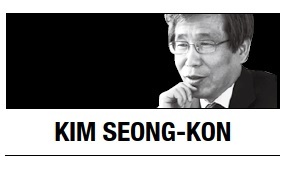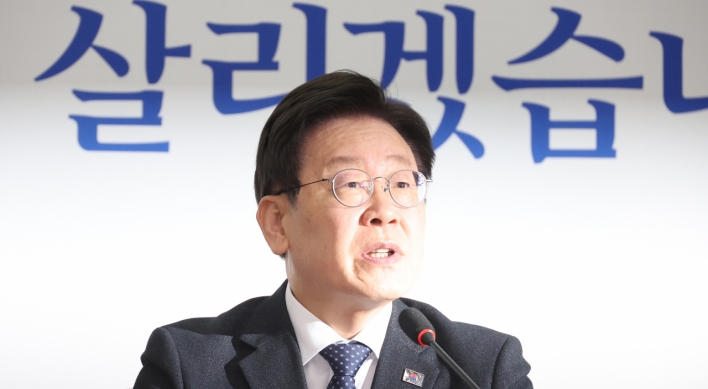[Kim Seong-kon] Is Korea a pawn on the international chessboard?
By Kim Da-solPublished : March 1, 2016 - 16:57
 Referring to the recent crisis on the Korean Peninsula, a Chinese newspaper compared Korea to pieces in a game of “baduk” (the board game also known as Go) between China and the United States. Reading the editorial, right-wing Koreans became furious, taking the remarks as an insolent affront to the dignity of Korea. On the contrary, left-wing Koreans took them as a cynical reminder that China and the States, not Korea, are the countries that can solve our problems.
Referring to the recent crisis on the Korean Peninsula, a Chinese newspaper compared Korea to pieces in a game of “baduk” (the board game also known as Go) between China and the United States. Reading the editorial, right-wing Koreans became furious, taking the remarks as an insolent affront to the dignity of Korea. On the contrary, left-wing Koreans took them as a cynical reminder that China and the States, not Korea, are the countries that can solve our problems.
The Chinese editorial reminded me of what U.S. Vice President Joseph Biden reportedly said some time ago during his visit to Korea, “It’s never been a good bet to bet against America. America will continue to place its bet on South Korea.” Interestingly, the Koreans’ response to Biden’s remarks was opposite at that time: right-wing Koreans thought of it as a friendly reminder that South Korea is an ally of the States, whereas left-wing people took it as an insult and warning to Korea.
In the eyes of China, Korea indeed may look like the tiny pieces on a game board. The two players can move their pieces at will to compete with each other and win the game, while the small pieces are helplessly manipulated and moved around by the almighty players. At the same time, in the eyes of the U.S., Korea may often seem to bet against America and rely too much on other countries. Caught in the vortex of international politics, Korea often needs to sway like a pendulum in order to survive and thrive. That has been the fate of Korea since the mid-20th century.
Nevertheless, perceiving Korea as nothing but trivial pieces on the checkerboard is misleading. Such a perception would gravely underestimate the potential of Korea because South Korea is no longer a helpless, powerless country of the early or mid-20th century. Today, Korea has emerged as a strong nation, an economic powerhouse with cutting-edge technology, and unprecedented cultural prosperity in the form of hallyu.
The Korean government’s bold announcement that South Korea was ready to bring THAAD from the States was a good example. It made Chinese Foreign Minister Wang Yi rush to Washington for talks with U.S. Secretary of State John Kerry just before the signing of the agreement. As a result, China announced that it would join the sanctions against North Korea, while the U.S. said it would consider deferring the deployment of THAAD on the Korean Peninsula.
Perhaps, Korea, once a powerless piece on the board, can now play the players off against each other. For example, using THAAD as leverage, we can demand that China exert its influence on North Korea. At the same time, when things go awry and the time comes when THAAD is imperative in Korea, we can demand the U.S. to deploy it at their own expense, arguing that ultimately it is a game between the two players.
Meanwhile, it would be wrong if the U.S. thought that Korea was betting on the wrong side, against America; the Koreans know that the U.S. is their blood ally and appreciate her everlasting friendship. However, the Korean people are simultaneously aware of the possibility that some of the assurances from the U.S. may be rhetorical at best and thus they should be prepared for the worst. It does not mean there are trust issues. Rather, it means that things may not turn out to be rosy for Korea, depending on the situation, due to the complexities of international politics. That is why Korea strives to maintain a good relationship with her neighboring countries while remaining a faithful ally of the U.S. And that is why Korea sometimes makes friendly gestures toward other countries that may not be friendly to the United States.
There is a maxim in Korea: “In a fight between whales, the shrimp gets crushed.” But Korea is no longer a shrimp among whales. Today, South Korea has become a smart, agile dolphin that can dexterously swim around fighting whales. People say that as a peninsula, South Korea has serious geopolitical disadvantages. But we can turn disadvantages into advantages, and crises into opportunities.
South Korea is neither a piece in a checker game nor a pawn in a chess game manipulated by the players. Those days are over. Instead, South Korea should become a player itself and play a vital role in keeping peace on the Korean Peninsula. For this, our politicians should see the bigger picture and view Korea from a broader perspective. Opinion leaders say that the situation of East Asia today is quite similar to that of the early 20th century. But they fail to see one crucial difference. South Korea is no longer the same old powerless country.
If only she can work out how to bluff, be poker-faced and skillfully pull the strings of international politics at the right moment, South Korea will surely become a player herself on the chessboard and may even achieve a checkmate.
By Kim Seong-kon
Kim Seong-kon is a professor emeritus of English at Seoul National University and the president of the Literature Translation Institute of Korea. -- Ed.




![[Herald Interview] 'Amid aging population, Korea to invite more young professionals from overseas'](http://res.heraldm.com/phpwas/restmb_idxmake.php?idx=644&simg=/content/image/2024/04/24/20240424050844_0.jpg&u=20240424200058)






![[Hello India] Hyundai Motor vows to boost 'clean mobility' in India](http://res.heraldm.com/phpwas/restmb_idxmake.php?idx=644&simg=/content/image/2024/04/25/20240425050672_0.jpg&u=)







![[Today’s K-pop] NewJeans' single teasers release amid intrigue](http://res.heraldm.com/phpwas/restmb_idxmake.php?idx=642&simg=/content/image/2024/04/26/20240426050575_0.jpg&u=)